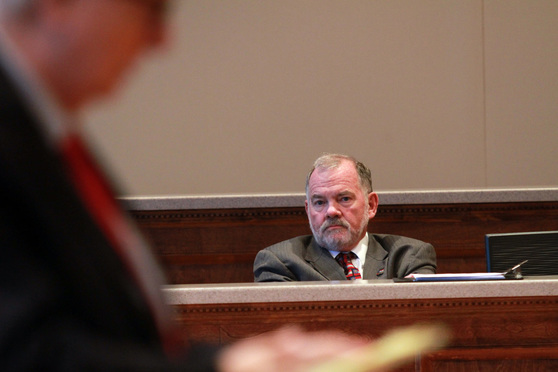Judge Affirms Legality of Judicial Watchdog Agency Appointments
The ruling rejected efforts by suspended Superior Court Judge Robert M. "Mack" Crawford to invalidate pending ethics charges against him and to stop an ethics hearing scheduled to continue Friday.
March 21, 2019 at 03:48 PM
4 minute read
 Judge Robert “Mack” Crawford, Superior Court, Pike County. At his JQC hearing on Monday Feb. 25, 2019. (Photo: John Disney/ ALM)
Judge Robert “Mack” Crawford, Superior Court, Pike County. At his JQC hearing on Monday Feb. 25, 2019. (Photo: John Disney/ ALM)
A judge has denied a petition to strip members of the state judicial watchdog agency of their authority to investigate a complaint against a suspended judge facing ethics charges.
Cobb County Superior Court Judge Ann Harris' order affirming the legality of the state Judicial Qualifications Commission's 10 appointees clears the way for the continuation of Griffin Circuit Superior Court Judge Robert M. “Mack” Crawford's ethics hearing Friday.
Crawford is scheduled to present his defense against charges that he violating the state Code of Judicial Ethics by improperly directing a court clerk to pay him $15,675 from the court registry shortly before Christmas in 2017. Crawford then deposited the majority of the money—which had sat unclaimed in the court registry since 2002—in his personal bank account and pocketed the rest, according to the pending charges.
The JQC suspended Crawford after he was indicted last year on charges of theft and violating his oath of office, both felonies. Crawford's arraignment is set for April 4.
Crawford has claimed he was owed the money from a previous case he handled as an attorney.
The JQC judicial panel handling the hearing is comprised of Fulton County Superior Court Chief Judge Robert McBurney, Atlanta attorney Jamala McFadden of Atlanta's McFadden Davis and Cobb County Police Chief Michael Register.
Harris handed down her order Thursday following a hearing earlier this week on Crawford's quo warranto petition. A quo warranto petition allows a petitioner to challenge another's right to hold public office.
Crawford's attorney, former Georgia Gov. Roy Barnes, filed the petition the day Crawford's ethics hearing opened on Feb. 25 in an unsuccessful effort to stop it.
Barnes contended at that hearing that state law governing JQC operations requires that commission appointees be submitted to the Georgia Senate for approval no later than the third Monday in January in order for them to be eligible for Senate confirmation. Appointees named to the JQC when the General Assembly is not in session may serve until their names are submitted to the Senate.
The current JQC members were appointed in 2017. Barnes contended that none of those appointments were submitted to the Senate until Jan. 18, 2018—three days after the legal deadline. Barnes backed up his claim with the Senate Journal, citing the Jan. 18 date. The state Constitution has established the journal as “the sole, official record” of Senate proceedings, Barnes said.
Barnes said that, while he respects Harris' order, “The plain language of the JQC law and the Constitution requires a different result.” JQC Executive Director Ben Easterlin, who faced off against Barnes at the March 18 hearing, declined to comment.
In her order, Harris cited testimony by two witnesses at the hearing. Irene Munn, who was former Lt. Gov. Casey Cagle's legislative counsel when the appointments were presented to the Senate in January 2018—testified that she received the appointment letters on Cagle's behalf prior to Jan. 15 and gave them to Senate Secretary David Cook by Friday Jan. 12, according to the judge's order. As lieutenant governor, Cagle also was president of the Senate.
Cook testified that he received and time-stamped each appointment on Jan. 12, 2018, Harris' order said. Cook also said he placed the appointment letters on the desk of every state senator on Jan. 18, 2018, according to the judge.
Harris' order also noted that Jan. 15, 2018, was the Martin Luther King Jr. holiday, and the Senate was not in session. The Senate's first legislative day after Jan. 12 was Jan. 18, 2018.
Both witnesses testified they were keenly cognizant of the deadline, as it was the first time that the Senate had been given legal responsibility for appointments other than those made by the governor.
“The court believes the use of the term 'the Senate' includes the body of that chamber of the General Assembly, including the Senate President and Secretary of the Senate acting as its officers,” Harris held.
In addition, she said, “There exists a presumption of regularity that requires the court to presume that public officers have properly discharged their official duties.” Crawford's “reliance on the Senate Journal to dissuade the court that the JQC appointees' names were properly submitted is unpersuasive,” she concluded.
This content has been archived. It is available through our partners, LexisNexis® and Bloomberg Law.
To view this content, please continue to their sites.
Not a Lexis Subscriber?
Subscribe Now
Not a Bloomberg Law Subscriber?
Subscribe Now
NOT FOR REPRINT
© 2025 ALM Global, LLC, All Rights Reserved. Request academic re-use from www.copyright.com. All other uses, submit a request to [email protected]. For more information visit Asset & Logo Licensing.
You Might Like
View All
Carrier Legal Chief Departs for GC Post at Defense Giant Lockheed Martin

A Looming Seismic Shift in the Rules of Evidence: The Far-Reaching Impact of Diaz v. United States
9 minute read
Mike Lynch's Brush With Prison Taught Him Life Is Precious. Then a Yacht Accident Proved Him Right

How Defense Attorneys Can Prepare for the Possibility of a Nuclear Verdict
6 minute readTrending Stories
- 1Gunderson Dettmer Opens Atlanta Office With 3 Partners From Morris Manning
- 2Decision of the Day: Court Holds Accident with Post Driver Was 'Bizarre Occurrence,' Dismisses Action Brought Under Labor Law §240
- 3Judge Recommends Disbarment for Attorney Who Plotted to Hack Judge's Email, Phone
- 4Two Wilkinson Stekloff Associates Among Victims of DC Plane Crash
- 5Two More Victims Alleged in New Sean Combs Sex Trafficking Indictment
Who Got The Work
J. Brugh Lower of Gibbons has entered an appearance for industrial equipment supplier Devco Corporation in a pending trademark infringement lawsuit. The suit, accusing the defendant of selling knock-off Graco products, was filed Dec. 18 in New Jersey District Court by Rivkin Radler on behalf of Graco Inc. and Graco Minnesota. The case, assigned to U.S. District Judge Zahid N. Quraishi, is 3:24-cv-11294, Graco Inc. et al v. Devco Corporation.
Who Got The Work
Rebecca Maller-Stein and Kent A. Yalowitz of Arnold & Porter Kaye Scholer have entered their appearances for Hanaco Venture Capital and its executives, Lior Prosor and David Frankel, in a pending securities lawsuit. The action, filed on Dec. 24 in New York Southern District Court by Zell, Aron & Co. on behalf of Goldeneye Advisors, accuses the defendants of negligently and fraudulently managing the plaintiff's $1 million investment. The case, assigned to U.S. District Judge Vernon S. Broderick, is 1:24-cv-09918, Goldeneye Advisors, LLC v. Hanaco Venture Capital, Ltd. et al.
Who Got The Work
Attorneys from A&O Shearman has stepped in as defense counsel for Toronto-Dominion Bank and other defendants in a pending securities class action. The suit, filed Dec. 11 in New York Southern District Court by Bleichmar Fonti & Auld, accuses the defendants of concealing the bank's 'pervasive' deficiencies in regards to its compliance with the Bank Secrecy Act and the quality of its anti-money laundering controls. The case, assigned to U.S. District Judge Arun Subramanian, is 1:24-cv-09445, Gonzalez v. The Toronto-Dominion Bank et al.
Who Got The Work
Crown Castle International, a Pennsylvania company providing shared communications infrastructure, has turned to Luke D. Wolf of Gordon Rees Scully Mansukhani to fend off a pending breach-of-contract lawsuit. The court action, filed Nov. 25 in Michigan Eastern District Court by Hooper Hathaway PC on behalf of The Town Residences LLC, accuses Crown Castle of failing to transfer approximately $30,000 in utility payments from T-Mobile in breach of a roof-top lease and assignment agreement. The case, assigned to U.S. District Judge Susan K. Declercq, is 2:24-cv-13131, The Town Residences LLC v. T-Mobile US, Inc. et al.
Who Got The Work
Wilfred P. Coronato and Daniel M. Schwartz of McCarter & English have stepped in as defense counsel to Electrolux Home Products Inc. in a pending product liability lawsuit. The court action, filed Nov. 26 in New York Eastern District Court by Poulos Lopiccolo PC and Nagel Rice LLP on behalf of David Stern, alleges that the defendant's refrigerators’ drawers and shelving repeatedly break and fall apart within months after purchase. The case, assigned to U.S. District Judge Joan M. Azrack, is 2:24-cv-08204, Stern v. Electrolux Home Products, Inc.
Featured Firms
Law Offices of Gary Martin Hays & Associates, P.C.
(470) 294-1674
Law Offices of Mark E. Salomone
(857) 444-6468
Smith & Hassler
(713) 739-1250






